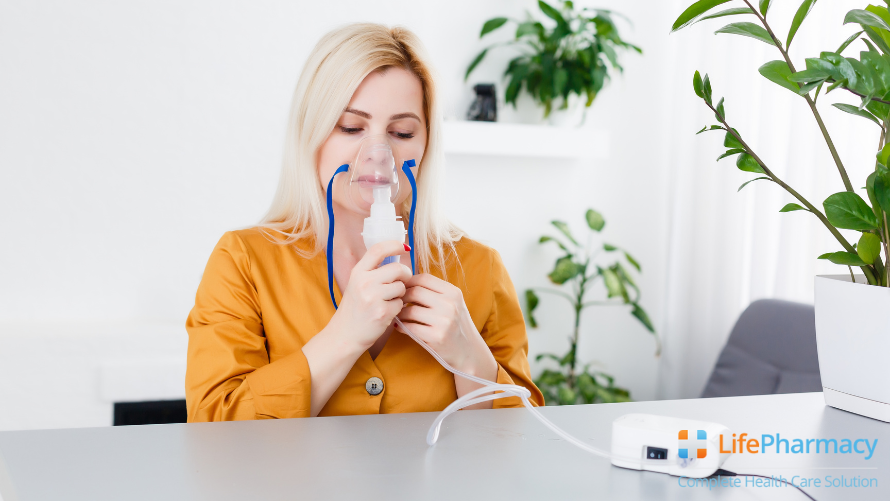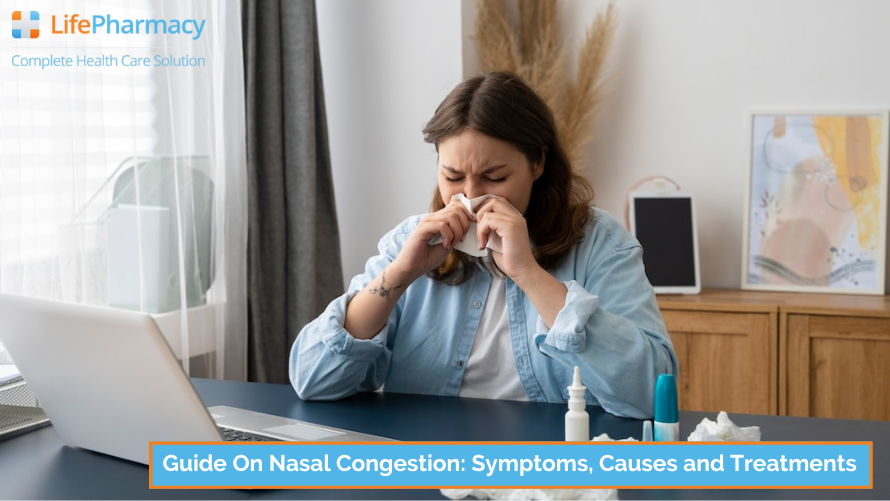UK online pharmacy have curated this complete guide on the symptoms, causes and treatments of nasal congestion:
What is Nasal Congestion (Stuffy Nose)?
Nasal congestion, also known as a stuffy nose, occurs when the tissues inside your nose become irritated and inflamed. This irritation triggers a chain reaction of inflammation, swelling, and excessive mucus production, making it challenging to inhale through your nose.
Nasal congestion can be a result of various factors, including allergies, the common cold, or sinus infections. While nasal congestion typically resolves within a few days, persistent or prolonged congestion may indicate an underlying infection.
If left untreated, nasal congestion can potentially lead to more serious conditions such as sinusitis, nasal polyps, or middle ear infections. It's important to address nasal congestion promptly to find relief and prevent further complications. Call Pharmacy Online for effective nasal congestion relief supplies.
Are you tired of dealing with a stuffy nose that makes it difficult to breathe?
Call Life Pharmacy UK to order your meds for fast relief.
What are the Symptoms of Nasal Congestion?
Nasal congestion is a common symptom experienced during a cough and cold or sinus-related issue. It can manifest in various ways, including:
-
Excessive Mucus Buildup
-
A feeling of stuffiness in the nose
-
Runny nose
-
Painful sinuses
-
Difficulty in breathing
How Does Nasal Congestion Affect People?
When your nose is congested, it can significantly impact your daily life. Breathing through your nose becomes a challenge, and you may find yourself resorting to mouth breathing. Excessive mucus may also result in a runny nose, making you constantly reach for tissues. In babies, nasal congestion can interfere with nursing or bottle-feeding.
What are the Causes of Nasal Congestion?

A multitude of factors can trigger this bothersome condition. Your nose serves as a frontline defense, filtering out dirt, particles, and allergens from the air you breathe. Hair and tiny structures called cilia work together to catch intruders and expel them through sneezing or blowing your nose. However, sometimes these defenses aren't enough, leading to inflammation and swelling of the nasal tissue.
When intruders slip past your nose's defenses, your immune system goes into action, producing mucus to wash away the invaders. This combination of swollen nasal tissues and increased mucus production can result in a blocked and stuffy nose, exacerbating your discomfort. Don't worry! Online chemists are available 24/7 to provide you with relief from nasal congestion.
Nasal congestion can be attributed to two main types of rhinitis: allergic rhinitis (hay fever) and nonallergic rhinitis.
Allergic Rhinitis:
-
Pollen: Trees, plants, and grasses release pollen during spring, summer, and fall, which can trigger an allergic reaction and result in nasal congestion.
-
Dust mites: Even in clean environments, dust mites residing in carpets, furniture, and bedding can cause nasal congestion in susceptible individuals.
-
Mold: Mold spores released into the air can induce allergic reactions and contribute to nasal congestion.
-
Pet dander: Allergies to pet dander, such as from cats or dogs, can lead to nasal congestion.
Nonallergic Rhinitis:
-
Environmental factors: Nasal congestion can be caused by exposure to smoke, strong odors (e.g., paint fumes), or consumption of spicy foods.
-
Medications: Certain medications used for high blood pressure or pain relief may have nasal congestion as a side effect. Click here to know more about blood pressure types, symptoms and treatments.
-
Hormonal changes: Puberty or pregnancy can result in hormonal fluctuations that trigger nasal congestion.
-
Infections: Sinus infections (sinusitis) or the common cold can lead to nasal congestion due to inflammation in the nasal passages.
-
Enlarged adenoids: Swelling of the adenoids, located behind the nasal passage, can obstruct airflow and contribute to nasal congestion.
Understanding the triggers behind nasal congestion allows you to identify potential causes and seek appropriate solutions.
What is the Treatment for Nasal Congestion?
The treatment for nasal congestion depends on the specific cause identified by healthcare providers. Here are the recommended treatments for allergic and nonallergic rhinitis:
Nonallergic Rhinitis Treatments:
-
Saline spray or rinse: Using a spray or rinse with a saline solution helps moisturize the nasal passages and eliminate excess mucus.
-
Antihistamines: These medications help alleviate the immune system's response to allergens, reducing inflammation and congestion.
-
Corticosteroid nasal sprays: These sprays reduce inflammation in the nasal tissues, providing relief from congestion.
-
Ipratropium bromide spray: This spray may help with runny noses, effectively reducing congestion.
Allergic Rhinitis Treatments:
-
Decongestant nasal sprays: These sprays provide relief from nasal congestion. However, they should not be used for more than three days to avoid worsening the congestion.
-
Anticholinergic nasal sprays: These sprays can help reduce excessive mucus production in the nose, relieving congestion.
In addition to this, you can also use the following to treat your nasal congestion
-
Nasal drops: Nasal drops provide quick relief for a blocked nose. However, it's important to use them for a maximum of 5-7 days to avoid rebound congestion. Remember that these products should not be used by children under 6 years of age.
-
Nasal decongestant tablets: These can provide temporary relief from nasal congestion, but they should be used cautiously and for a limited duration due to potential side effects.
-
Nasal strips: These adhesive strips are placed on the nose to widen the nasal passages and improve airflow.
What Are Some Effective Home Remedies To Combat Nasal Congestion?

Here are some effective ways to find relief from nasal congestion:
-
Humidifiers: Keep the air moist with a humidifier to soothe inflamed nasal passages. Dry air can worsen congestion, especially in hot and dry weather. Using a humidifier consistently helps maintain optimal humidity levels in your surroundings.
-
Steam inhalation: Safely inhale steam to alleviate congestion. You can do this by placing boiling water in a basin or using a steam cup with a lid and mask. Breathing in the steam for 5-10 minutes provides relief. For kids, a steamy bathroom with a closed door from running hot water or shower can be a safe alternative.
-
Hydration: Increase your water intake to help flush out toxins and clear mucus from your sinuses. Warm liquids like soups and broths can also provide relief and fight congestion.
-
Warm compresses: Apply warm compresses to help unclog thick mucus. Soak a towel in warm water, squeeze out the excess, and gently place it around your nose for about 30 seconds. Repeat as needed for congestion relief.
-
Elevation: Keep your head elevated while sleeping to improve breathing. Placing a warm towel on your face can also help ease congestion.
How Can We Prevent Nasal Congestion?
-
Allergy management: Identify and avoid allergens that trigger your congestion. Consult with a doctor for allergy medication to effectively manage your allergies.
-
Addressing underlying causes: If nasal congestion is due to structural issues like a deviated septum or nasal polyps, surgical intervention may be necessary to alleviate the congestion.
-
Lifestyle modifications: Avoiding triggers such as pets, smoking, and environmental irritants can help reduce nasal congestion.
When Do I Need to Consult a Doctor for Nasal Congestion?
Knowing when to seek medical care for nasal congestion is crucial for proper diagnosis and treatment. While nasal congestion often resolves within a few days, there are certain situations where it is important to consult a doctor.
Here are some guidelines:
Persistent congestion: If your nasal congestion lasts for more than two weeks without improvement, it may indicate an underlying condition that requires medical attention.
Severe symptoms: If your congestion is accompanied by a high fever lasting more than three days, green nasal discharge, sinus pain, or other severe symptoms, it is recommended to see a doctor promptly.
Underlying health conditions: If you have a weakened immune system, asthma, emphysema, or any other chronic health condition, it is advisable to seek medical care to manage and monitor your nasal congestion.
Head injury: If you have recently experienced a head injury and are now experiencing bloody nasal discharge or a constant flow of clear discharge, it is important to consult a healthcare professional.
Difficulty in feeding: If your nasal congestion is affecting the well-being of your newborn baby, causing difficulty in nursing or bottle-feeding, seeking medical care is necessary to ensure their proper feeding and address any potential concerns.
Conclusion
Don't let nasal congestion disrupt your daily activities and well-being.Whether it's seasonal allergies, exposure to irritants, or a common cold causing your stuffy nose, Life Pharmacy UK has the solutions you need.
Whether you're experiencing temporary congestion due to a common cold or dealing with chronic symptoms, consulting with a healthcare provider is essential. They can help determine the underlying cause and recommend appropriate treatments. Take charge of your nasal congestion and regain your ability to breathe freely.






